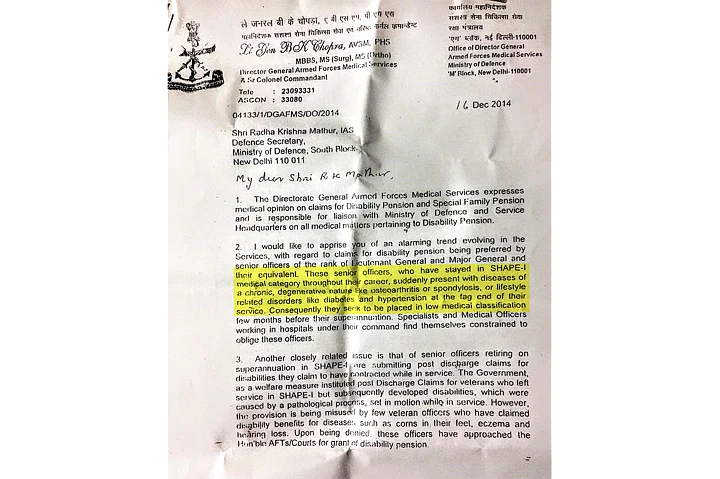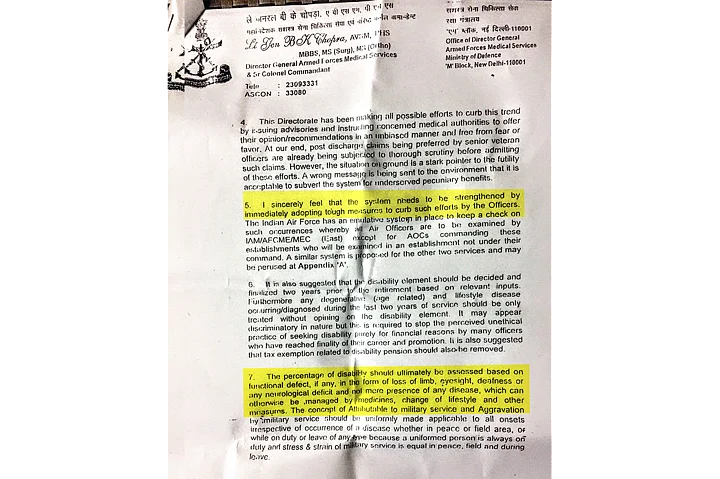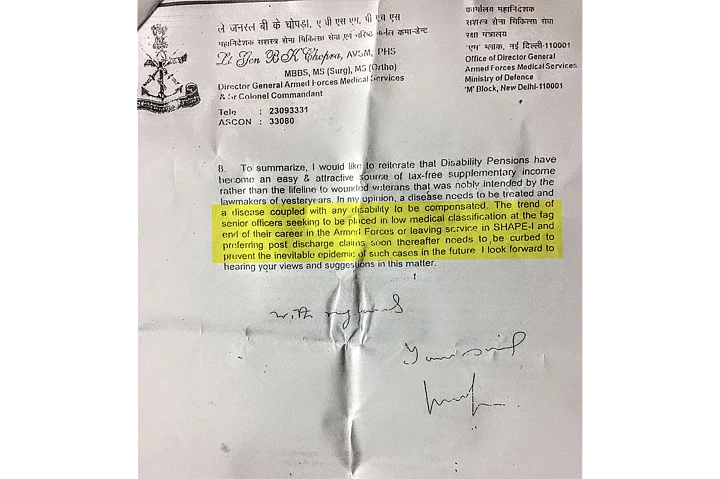A 2014 letter written by the then director general of armed forces medical services (DGAFMS), which exposes how senior officers falsify documents to claim disability pension benefits, may have been an important input for the Seventh Pay Commission to base its recommendations that lowered the pension range for armed forces officers and other ranks.
While all other recommendations of the commission were essentially based on proposals by the affected organisations/agencies, the one resulting in the reduction in disability pension for armed forces was not suggested by anyone. It suo motu made unsubstantiated remarks about increase of disability pension cases among officers as compared to lower ranks.
Also Read: Ex-Servicemen Train Guns on Disability Pension Cut
Why Single Out Defence Services?
It’s interesting that while disability benefits are available to all government servants and not restricted to the armed forces, no data was presented about others. It would be rather difficult to imagine that misuse of the provisions are limited to some among the senior ranks of the armed forces alone, and that there is no similar exploitation in other services. The singling out of the defence services to bring about changes was therefore rather strange.
One of the things that keeps a soldier from hesitating while faced with life or limb-threatening danger in the face of enemy is the firm belief that in the event of anything happening to him, he or his family will be well taken care of by the government. Benefits to the next of kin of martyred soldiers, or to disabled soldiers, are not something that even critics of state expenditure should grudge.
It’s not, therefore, surprising that recent reports of the government that claimed that the Seventh Pay Commission recommended changes in the system of calculating disability pensions for armed forces, which would place majority of those in receipt of such a pension at a comparative disadvantage, were met with a combination of disbelief and anger. What made this even more ironic was that the notification was issued around the same time that the nation was lauding the army for the cross-LoC surgical strikes.
DGAFMS' Letter to the Defence Secretary
The inevitable storm of protests from all sections of society that followed this decision led to it being suspended with the defence minister ordering that the matter be referred to the anomalies committee.
That’s where things rested, till about three days ago the DGAFMS’ letter to the then defence secretary started circulating in social media.
In it, the DG, who is the senior-most medical officer in the armed forces, complained that a large number of senior officers were misusing the disability pension rules by forcing doctors to endorse their eligibility for such pensions just before retiring.
This was followed by a front page story in the Hindustan Times titled ‘Retiring military officers abuse disability benefits for higher pensions’.
What Does the DGAFMS’ Letter Say?
- Alarming
trend visible with regard to claims for disability pension preferred by senior
officers of the rank of Lieutenant General and Major General.
- Senior officers who’ve stayed in SHAPE-I medical
category suddenly seem to present cases of chronic, degenerative diseases.
- At our end, post discharge claims being subjected to
thorough scrutiny before admitting such claims.
- Percentage of disability should be assessed on the
basis of functional defect, and not by disease that can be managed by
medicines.
Senior Functionary Admits Lapses
A couple of things are strikingly interesting about these chain of events. The first is the letter itself. One would not doubt the concerns raised in it. There isn’t a process or system in the world which is not exploited by a few outliers for their own unfair gains, and it’s difficult to imagine the disability pension provisions would be any different.
Media reports of a former Army chief being placed in a lower medical category shortly before his retirement had caused a furore a few years ago, leading him to publicly announce that he would not be taking disability pension benefits. It’s another story that he is allegedly receiving them even now. There was also an alleged case where a very senior officer, placed in low medical category in the last year of service, was suddenly declared fit again when distant chances of his being elevated to the chief emerged.
But what’s strange about the letter is that it’s not usual for a senior functionary to admit to failure in preventing malpractices by people under his administrative and technical control, i.e., the doctors. To do so in writing, and that too in a letter addressed to his own boss, is tantamount to acceptance of one’s incompetence.
Wouldn’t it be more realistic to institute measures well within one’s powers to prevent cases of misuse of the provisions?
This would entail strict orders to all doctors not to falsify any medical reports and bring to his notice instances of pressure, with the assurance of full support and protection. Simultaneously he could enforce accountability on doctors by instituting random checks on senior officers’ medical board proceedings, with strict action assured against the certifying doctors if any false reporting was found.
Disability Pension Reduced
The proposed changes met with predictable objections from within the armed forces, and this was combined with public outrage which was embarrassing for the government. On the one hand it was seen as lauding the armed forces for its role in the surgical strikes while on the other it was agreeing to a cut in the dues to disabled soldiers. One can imagine that this would have led to the defence minister asking tough questions to officials responsible for putting the government in an awkward situation.
Uncomfortable Questions
Then followed the HT report. Studying the chain of events closely gives rise to some questions:
- What prompted the DGAFMS to write such a self-deprecating letter admitting his incompetence in stopping the falsification of documents by doctors?
- While the DGAFMS has written about doctors being unable to resist pressure from senior officers, did he give in to pressure to write such a letter?
- Was there any link between the letter and the suo motu decision of the Seventh Pay Commission to reduce the disability pensions, citing disproportionate benefits to senior officers?
- If so, who leaked the letter to the Pay Commission, and with what motivation?
While the answers to these questions may remain in the realm of speculation, the embarrassment caused to the government by the disability pension fiasco is real.
(The writer is a retired colonel of the Indian army and currently a research fellow at the Ministry of Defence, writing the official history of India’s participation in World War I. He can be reached at @ragarwal. This is an opinion piece and the views expressed above are the author’s own. The Quint neither endorses nor is responsible for the same.)
(At The Quint, we question everything. Play an active role in shaping our journalism by becoming a member today.)
.jpg?rect=0%2C0%2C2000%2C1125&auto=format%2Ccompress&fmt=webp&width=720)


